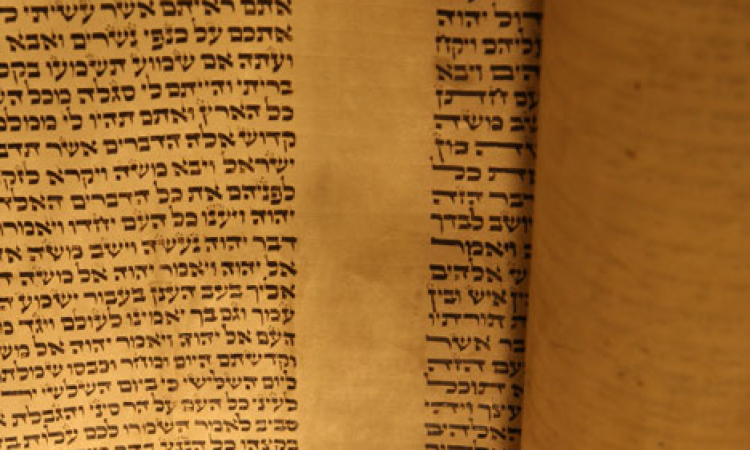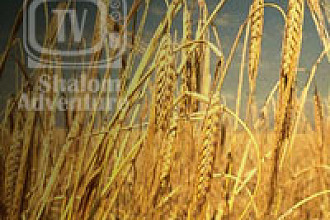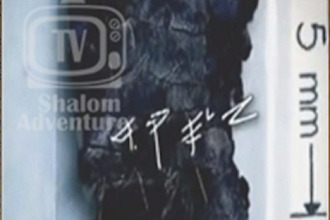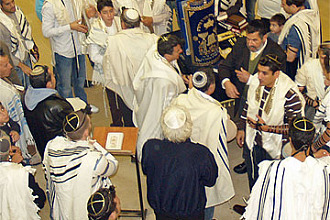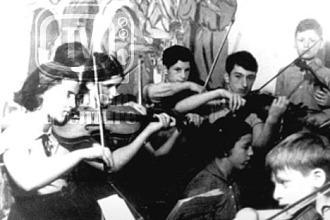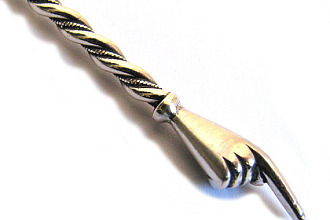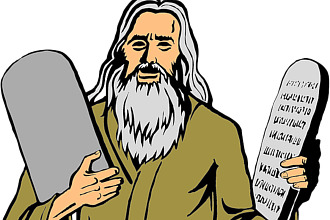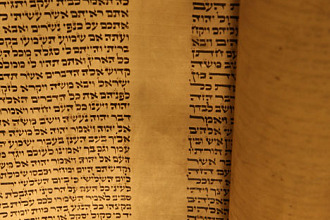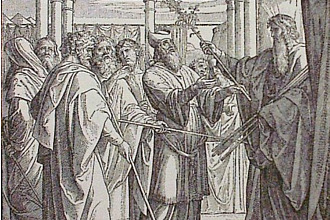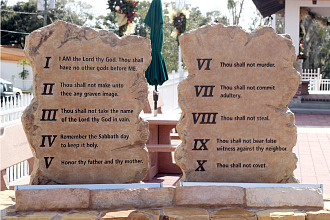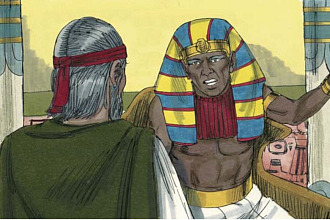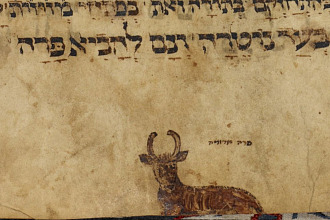Parasha for the Week: Baha’Alotcha Numbers 8:1 – 12:16
Haftara for the Week: Zechariah 2:14 – 4:7
Apostolic Writings: Revelation 1:12 - 20
Overview:
Aharon is taught the method for kindling the menorah. Moshe sanctifies the levi’im to work in the Mishkan. They replace the first-born, who were disqualified after sinning at the golden calf.
The levi’im are commanded that after five years of training they are to serve in the Mishkan from ages 30 to 50; afterwards they are to engage in less strenuous work. One year after the Exodus from Egypt, G-d commands Moshe concerning the korban Pesach. Those ineligible for this offering request a remedy, and the mitzvah of Pesach Sheini, allowing a “second chance” to offer the korban Pesach one month later, is detailed. Miraculous clouds that hover near the Mishkan signal when to travel and when to camp. Two silver trumpets summon the princes or the entire nation for announcements.
The trumpets also signal travel plans, war or festivals. The order in which the tribes march is specified.
Moshe invites his father-in-law, Yitro, to join the Jewish People, but Yitro returns to Midian. At the instigation of the eruv rav — the mixed Egyptian multitude who joined the Jewish People in the Exodus — some people complain about the manna. Moshe protests that he is unable to govern the nation alone. G-d tells him to select 70 elders, the first Sanhedrin, to assist him, and informs him that the people will be given meat until they will be sickened by it. Two candidates for the group of elders prophesy beyond their mandate, foretelling that Yehoshua instead of Moshe will bring the people to Canaan. Some protest, including Yehoshua, but Moshe is pleased that others have become prophets. G-d sends an incessant supply of quail for those who complained that they lacked meat. A plague punishes those who complained. Miriam tries to make a constructive remark to Aharon which also implies that Moshe is only like other prophets. G-d explains that Moshe’s prophecy is superior to that of any other prophet, and punishes Miriam with tzara’at because she gossiped about her brother. Moshe prays for her, and the nation waits until she is cured before traveling.
"SCIENCE WITHOUT G-D"
The parasha starts saying: “Now the LORD spoke to Moses, saying, “Speak to Aaron and say to him, When you set up the lamps, the seven lamps shall give light in front of the lampstand.” And Aaron did so: he set up its lamps in front of the lampstand, as the LORD commanded Moses.” (Numbers 8:1–3) when worshiping the Almighty, the light of G-d is so crucial that it must “face the center”. Rabbi Shraga Simmons says “Greece was once a mighty empire. The Greeks promoted beautiful fashion, fine dining, sonorous music, aesthetic arts, vigorous athletics, and captivating entertainment. In the essential fields of scholarship, the Greeks were the most advanced and sophisticated of their time.
But why didn’t the Greek empire survive for more than a few hundred years? Historians concur they were destroyed by moral decay. Jealousy, greed and promiscuity eroded the society until it crumbled. “Knowledge” without G-d is a recipe for disaster. We simply cannot and will not survive without a clear moral direction.
The Greeks had gods—an entire pantheon, in fact. But these were man-made gods, the kind that get jealous and argue and commit immoral behavior of their own. Man cannot develop his own objective system, because man—as part of the group that the system is designed for—is inherently subjective. The Greek gods were not the kind to aspire to, rather these gods were invented to excuse man’s own corrupt behavior.
The most jarring example, of course, is Nazi Germany. Germany was known for it’s leading academic institutions, advancement in the arts, and impeccable social conduct. Where did it all lead? At the Wanasee Conference (the Nazi meeting to formulate the “Final Solution” for the extermination of Jews), 9 of the 13 participants were Ph.D.s. These were the most creative, scientific minds in the entire civilized world. Yet in a remarkable act of self-deception, they were able to redefine “morality” toward ultimate evil. It was a godless technology, knowledge without wisdom.” Science or knowledge without G-d is useless.
What is good and evil cannot be known without the light of G-d, David one day said “Many say, “Who will show us any good?” L-rd, let the light of your face shine on us.’ (Psalm 4:6). Yeshua is the light who came to this world “The true light that enlightens everyone was coming into the world.” (Yochanan 1:9) If we want to know what is good, we should read his teaching in the Besorot (gospels).
"THE CHOICE OF G-D"
Our parasha presents two people that we don’t know very well, Eldad and Medad. “Now two men remained in the camp, one named Eldad, and the other named Medad, and the Spirit rested on them. They were among those registered, but they had not gone out to the tent, and so they prophesied in the camp.” (Numbers 11:26) According to the Jewish tradition Eldad and Medad come from a special background. Moses established, under G-d’s command, the first Sanhedrin of 70 elders. But it was not easy to choose 70 people among 12 tribes. If we multiply 12 by 6 we got 72. To make the choice of 70 elders Moses had to choose 6 elders from 10 tribes and 5 elders from 2 tribes. This situation was not easy to manage, the two tribes who gave only 5 elders could feel disadvantaged especially when important decisions were being voted, and these two tribes could complain for being under-represented. When we look at the Bible we understand that Moses has made a choice of 6 elders by tribe, that is why even Eldad and Medad were among the chosen “They were among those registered” (Numbers 11:26), But G-d has made the final choice, however in order to avoid jealousy, G-d gave to Eldad and Medad the gift of prophecy, and they prophesied in the camp of Israel next to Moses, Aharon and Myriam.
Haftarah: Zechariah 2:14 - 4:7
In the text of the parasha the L-rd commanded Aaron to atone the Cohanim: “When you bring the Levites before the L-RD, the Israelites shall lay their hands on the Levites, and Aaron shall present the Levites before the L-RD as an elevation offering from the Israelites…” (Num. 8:10-12).
Our haftara is about another priest. “Then he showed me the Cohen Hagadol Joshua standing before the angel of the L-RD” (Zec 3:1).
We have in this haftara a beautiful story about Joshua the Cohen Hagadol, Zerubbabel and the angel of the L-rd. We have already spoken about the angel of the L-rd, a special angel who is the great Michael, the one who has the power to forgive the sins of Israel (Exodus 23:20). In our story the angel came to give forgiveness to the Cohen Hagadol Joshua. “Now Joshua was dressed with filthy clothes as he stood before the angel. The angel said to those who were standing before him, “Take off his filthy clothes.” And to him he said, “See, I have taken your guilt away from you, and I will clothe you with festal apparel.” And I said, “Let them put a clean turban on his head.” So they put a clean turban on his head and clothed him with the apparel; and the angel of the L-RD was standing by” (Zechariah. 3:3-5).
But also to give to Joshua a special message: “If you will walk in my ways and keep my requirements, then you shall rule my house and have charge of my courts, and I will give you the right of access among those who are standing here.” (Zech. 3:7). For G-d the requirement is always the same, to be faithful to him. Then the angel give a wonderful promise, the promise of the Messiah called “the Branch”
“Now listen, Joshua, Cohen Hagadol, you and your colleagues who sit before you! For they are an omen of things to come: I am going to bring my servant the Branch.” (Zech. 3:8) This “branch” is a branch coming from the genealogy or “tree” of Jesse and it is called the “Branch of the L-rd” (Isaiah 4:2). It is the Messiah. Yeshua is a descendant of Jesse and David, He is the “Branch.”
Apostolic Writings: Revelations 1:12-20
The Menorah Aaron and his sons have to light in the Sanctuary, has several meanings. It is the symbol of the shining light of the Messiah and shining light of G-d’s people. It is certainly the reason why the Menorah looked like a tree with its root (base), branches and flowers (Exodus 25:31–32), which is also a metaphor of G-d’s people. The lampstands symbolizing the shining light of G-d’s people is the key illustration to understand the first chapters of the book of Revelation called in Hebrew “Hitgalut Yeshua Hamashiach”, a revelation from Yeshua.
Before going further, it is important to clarify some points about this book of Revelation or of Hitgalut. I like these titles even though in the original Greek the title is Apokalupsis, or as it is given in French Apocalypse. Most of the time, this word, wrongly inspires fear to people. It became the synonym of catastrophe, end of the world. However, this book is, as it translated in English and in Hebrew, a Revelation from Yeshua about the history of G-d's people. And what we must know about this book is that only a Jewish believer in Yeshua could write it. This book is full of quotations from the Hebrew Bible, in fact 68% of this book are direct quotations, allusions or references from the Hebrew Bible. All the metaphors are from the Hebrew Bible. The full book is structured in the way the Hebrew Bible is structured. This structure is called "Chiastic" from the Greek letter X where the first part is in connection or parallel with the last part and the second part is in connection with the penultimate part of the text etc. This structure of Revelation can be illustrated as A, B, C, D, C' B', A'. A goes with A', B goes with B' and C goes with C' and D is the central part of revelation.
Introduction (1:1-8)
A. The 7 Churches: (1:9-3:22)
B. The 7 seals: (4:1-8:1)
C. The 7 trumpet: (8:2-11:18)
D. The Tree Monsters (11:19-14)
D1 The dragon and the women
D2 The Beast of the Sea
D2' The Beast of the earth
D1' The Lamb and God's people
C' The 7 plagues: (15:1-18:24)
B' The marriage supper of the Lamb and the millennium (19:1-21:4)
A' The Church on the new earth (21:5-22:5)
Conclusion (22:6 - 21).
And the influence of the Hebrew Bible on this book of Revelation is so great that each part of the book is introduced by a description of the Israelite sanctuary:
A. The High Priest among the 7 lampstands.
B. The Lamb who was slain
C. The altar with a golden censer
D. God’s temple in heaven was opened, and the ark of his covenant was seen within his temple.
C' The sanctuary of the tent of witness in heaven was opened
B' The loud voice in heaven . . . Salvation and glory and power belong to our God,
A' The gates the names of the twelve tribes of the sons of Israel were inscribed, which remand us the twelve tribes sitting around the sanctuary in the wilderness.
Coming back to the frist chapter, when Yochanan, the writer of this book, heard a voice, he turned his face towards the voice and saw seven golden lampstands, and in the midst of the lampstands Yeshua walking “Then I turned to see the voice that was speaking to me… I saw seven golden lampstands, and in the midst of the lampstands one like a son of man” (Revelation 1:12–13). The vision of Yeshua is extraordinary, he looks like G-d “The hairs of his head were white, like white wool, like snow. His eyes were like a flame of fire, his feet were like burnished bronze, refined in a furnace, and his voice was like the roar of many waters.” (1:14–15). And when Yeshua spoke to Yochanan He applied to Himself one of G-d’s title “I am the first and the last, and the living one” this affirmation was already said by G-d: “Listen to me, O Jacob, and Israel, whom I called! I am he; I am the first, and I am the last.” (Isaiah 48:12).
In this vision, which is a revelation of the future of G-d’s people (1:1-3), Yeshua reveals to Yochanan that His people will have a great mission on the earth, “to be a light to the nations” and to reveal to the world the plan of salvation, which is in fact the victory of G-d in a great conflict between Yeshua and Satan (Revelation 12). The light of Yeshua’s people is symbolized by the lampstands, he said clearly “the seven lampstands are the seven congregations” (1:20). These seven congregations are described in the chapter 2 and 3 of the book of Revelation, revealing G-d’s message during the seven periods of human history, between the first and the second coming of Mashiach. The last component of their messages is a promise given to each one who participates to share the last message “I will grant him to sit with me on my throne, as I also conquered and sat down with my Father on his throne.” (Revelation 3:21).

